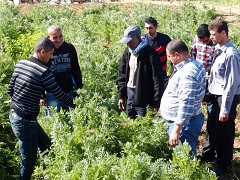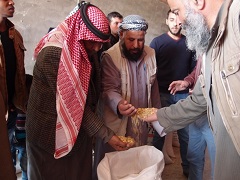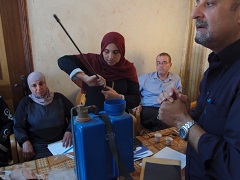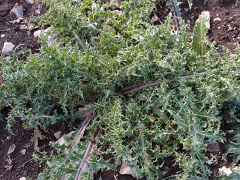"The Project on Improved Extension for Value-Added Agriculture in Palestine (EVAP-2)" aims to increase income of the target farmer group members through strengthening implementation and management capacity of the concerned officials of Ministry of Agriculture (MOA), based on principles of SHEP Approach: "1. Enhancement of awareness and motivation of farmers before technical trainings", "2. Agriculture as business", and "3. Autonomy (People need to feel in control of their own behaviors and goals), Competence (People need to gain mastery of tasks and learn different skills) and Relatedness (People need to experience a sense of belonging and attachment to other people)".
Palestinian farmers show a variety of interests. How can we motivate them respectively?
As the first step to motivate farmers, we conduct "Awareness Creation Tour" to visit small/medium-sized farmers who practice market-oriented agriculture of stable and high profitability and encourage the farmers to realize their differences from their own agricultural practices. Followingly, "Market Visit" is carried out where the farmers can select and visit market of their interests to obtain market information.
There are diverse farmers in Palestine such as livestock farmers who can sell at high price if they can produce, part-time farmers who are interested in labour-saving than selling at higher price, and female farmers who hesitate to visit wholesale markets conventionally. Therefore, to serve their interests, the farmers are given chances to visit not only wholesale markets but also 1) farm input shops and nurseries to purchase good agricultural inputs at lower prices and 2) retailers and food processors in order for female farmers to visit easily. In these activities, participatory approach is adopted for the famers to be decision-makers in selection and planning of market visits for themselves [Farmers' Autonomy].
Farmer-to-farmer extension with satisfaction of farmers' interests
Next, technical trainings take place following the farmer groups' training plans formulated by farmers. In training materials, easy-understanding is emphasized with such means as quoting other farmers' examples in accordance with their interests [Farmers' Competence]. One of critical issues for Palestinian farmers is competition with high-quality agricultural products coming from Israel. Such influx is unpredictable since distribution is not manageable for security reasons. Thus, extension of agricultural products to avoid competition is sought out to utilize differences between Palestinian food culture and Israeli one. Moreover, an official Facebook account of MOA (account name is: "Ershad Moa") is utilized as a platform to disseminate and share information on EVAP-2 activities among target farmer groups. We also intend to connect the farmers who have never been in contact with to each other and build network to share information and examples of good practices extensively and sustainably [Farmers' Relatedness].
Can bridging information gap between men and women lead to increase in their agricultural profits?
Information gap between men and women affects agricultural profits in Palestine because male farmers can have more access to information from outside conventionally. We promote practical gender mainstreaming to directly link to increase in agricultural profits in fulfilling such gap by technical trainings.
Will these specific concepts of EVAP-2 be successful at last? The project goes on another three years…let's find out.

Vegetable farmers who compared
"Good Practice Farmers" who are
involved in market-oriented agricu
lture with themselves and realized
their differences

Livestock farmers who obtained
important market information from
a feeding company considered to
be placed in "upstream markets of
value-chain"

Female farmers who participated
in a technical training on use and
maintenance of sprayers for apply
ing pesticides to fulfill the informat
ion gap between men and women

Gundelia in season in spring, a
niche market but value-added pro
duct (like taranome and fukinoto
in Japan) that is rare for Israeli far
mers to produce




scroll